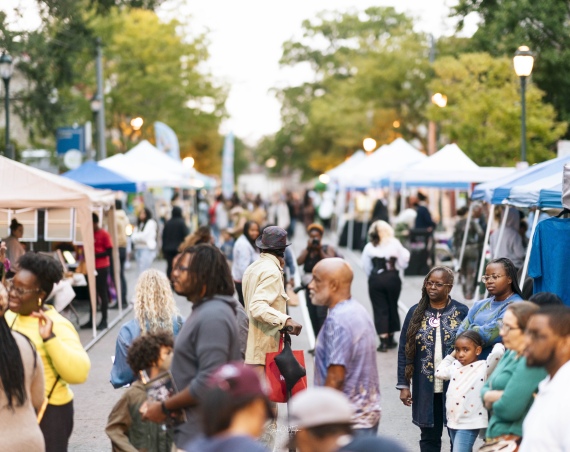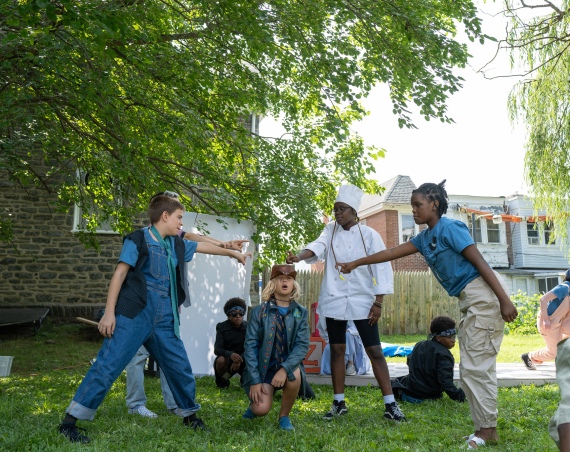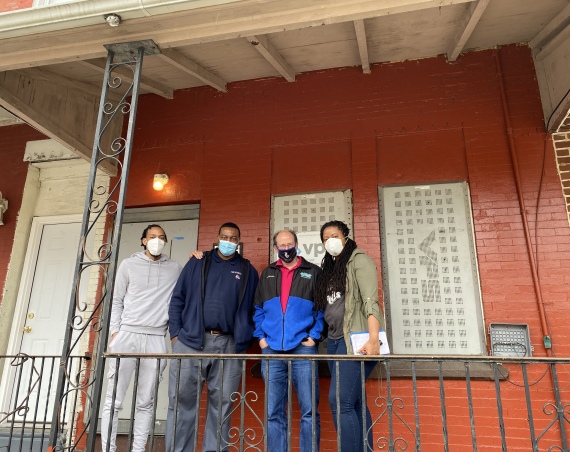Germantown business owners say they wish they had more support seeking funding during that time.

March marked three years since Philadelphia announced the COVID-19-induced shutdown, which would force all nonessential businesses to close temporarily. The shutdown was a strategic plan to stop the spread of the coronavirus, which was widely known as “flattening the curve.” Over the next two years, essential and nonessential businesses would adjust their protocols and operations to provide services to patrons as safely as possible and keep their doors open.
The Germantown Info Hub connected with four different local businesses to talk about their experiences pre-pandemic, the first year of the pandemic, and now. Those four businesses are:
- A&N House of Produce (Grocery)
- Attic Brewing Company (Brewery)
- Perfectly Flawless Boutique (Retail)
- YaYa’s Place Family Daycare Center (Childcare)
After speaking with these businesses, here are the major ways they changed in the past three years, including what they’re still doing even as pandemic restrictions have been lifted.
Business across industry was fine pre-pandemic, even for a newer entity.
Perfectly Flawless Boutique has been in Germantown since 2014. The owner, Crystal Jackson, says “business was pretty good” before the March 16, 2020 shutdown announcement. Other businesses interviewed echoed that sentiment, even for Laura Lacy, who opened up the Attic Brewing Company in January 2020, just two months before the life-altering city mandate.
Lacy says she and her husband worked for about four years to open the taproom, which included some pop-up events across the neighborhood. They hoped to become a destination brewery for the Germantown area, and they did instantly.
The first few months had a “nice crowd of people coming through,” Lacy says. “A lot of people who had learned about us and followed our story all the way back to 2016 were really excited to see that finally, after four years, we’ve finally gotten it open. So that was great. Busy bar and lots of people coming through.”
Catherine Burch has been operating YaYa’s Place Family Daycare Center since 2003, working in her home until 2018, when she moved the daycare to Germantown Avenue. She also says they were financially strong and finally “finding their footing” in their newer location.
It wasn’t until the shutdown announcement did these businesses have to worry about their future in the neighborhood.
Canning and T-shirts help businesses survive
As mentioned, nonessential businesses were mandated to close their doors during the first few months of the COVID-19 pandemic. Out of the four, only A&N Produce was considered an essential business under the guidelines given by the city. The grocery’s experience in the early days of the pandemic was vastly different from what was reported by others.
“There were some tears and a lot of anxiety,” Lacy of Attic Brewing says, reflecting on the shutdown notice. “Everything that we have is invested in our business. So the idea that we just got our brewery open, and now we have to close it down was very scary.”
Attic Brewing Company was in a sticky situation and eventually started canning their beer to be able to sell when people couldn’t drink at a bar. Lacy says in 2020, they successfully canned, steamed, labeled, and delivered 75,000 cans of beer. This new strategy allowed them to keep their staff of eleven employed.
In June 2020, they opened their outdoor beer garden, which allowed them to host events outside throughout the rest of the year and into 2021.
Jackson of Perfectly Flawless recalls her initial reaction to the shutdown: “I did not take them seriously, so I didn’t close. If people want to come, this is my livelihood.” She says that was only for the first 36 hours after the announcement, and then when she realized the panic it caused in people, she realized it was a real emergency.
Initially, Jackson ran Perfectly Flawless as a showroom specialty store. Most patrons sought attire and accessories for grand events like proms, baby showers, and birthdays. After the pandemic, she switched up her inventory to include t-shirts and denim.
She says, “I had to keep thinking out of my norm because now people don’t want birthday outfits. They want a cute, cozy, in-the-house outfit now. And that challenged me as a stylist because I’m used to styling for special occasions.”
“I always had [T-shirts and denim],” Jackson says. “But they weren’t primarily what I would have. The pandemic made me have to rethink my inventory.”
This worked well for Jackson as she switched to online orders for some time when customers asked her to start putting her new items online. Jackson offered free shipping to those in Philadelphia and also began offering curbside pickup for a bit.
Burch at YaYa’s Place didn’t have an option to pivot, as she could only close her childcare center until it was safe to reopen. During this time, her employees received unemployment benefits.
The essential business scrambled to meet higher demand.
A&N (named after founders and owners Alex & Nina) House of Produce has been in the neighborhood for 24 years, as they opened on Greene Street in 1999. A&N House of Produce has been the most consistent fresh produce provider in the Northwest section of Philadelphia. Residents of other neighborhoods often come to it to shop for produce.
A&N House of Produce manager, and son of Alex & Nina, Dan Dvor, says the community has always supported the store since its inception. Dvor says the support has allowed them to offer different products, produce, and groceries yearly. This support carried into the pandemic, as they were one of the essential businesses, increasing the demand for products from patrons.
“I’ve never experienced that kind of demand from the customer side,” Dvor says. “Of course, it was a dangerous time, and we’re all cognizant of that. But personally, for me, [someone] responsible for buying, it was a huge adrenaline rush. If I was buying five or ten lemons, that amount was doubled.”
That demand came with its obstacles. Dvor says his family was pulling 10-15 hour days to manage the need and the challenges, including covering for employees who left. He describes how a typical day began to look for him.
“I would get up at three or four in the morning to go buy the produce,” Dvor recalls. “And then I wouldn’t finish [work] until late at night because our employees left the business, and it was hard to find replacement help. So we’re shorthanded and then were hit with a lot of business. So it was morning ‘till night where all we did was work.”
Dvor says this high demand lasted for only a few months until about June 2020. The store implemented curbside pickup for some time but said that was also too much, as they didn’t have the technology for a successful system.
In June 2020, A&N House of Produce also launched its second store in West Oak Lane, a neighborhood across from East Germantown. Dvor says he thinks part of the business leveling out was due to fewer people traveling to their original store from other areas.
These businesses were either unaware of the lending and grant programs or didn’t have the information to seek them confidently.
Of the four businesses, Burch’s was the only one that confidently disclosed that they applied for loans and grants to help reopen the childcare center. “Everything I applied for, I got it,” she shared. “I got the [Economic Injury Disaster Loan] loan, the [Paycheck Protection Program] loan, and any grant being given.”
Burch says that having tools and resources like an accountant or some accounting software is crucial because you have to organize your finances to apply for these things. She says QuickBooks made the process easy, allowing everything to work out for her.
The Attic Brewing Company got rounds one and two of the PPP loans but was ineligible for the EIDL loan from the U.S. Small Business Administration (SBA). The EIDL denial was its own problem for Lacy. She says a lack of awareness from the SBA around the store’s opening was the primary reason.
“The process was extremely complicated. We didn’t have revenue in 2019,” she discloses. “The stipulation was that you had to be in business before February 15. But, in order to prove that, they wanted a 2019 tax return. So there was just a misunderstanding about that.”
The brewery also did not qualify for the Restaurant Revitalization Fund, which Lacy says most breweries that received the grant got around $500,000-600,000.
Lacy shared that many businesses didn’t take advantage of the programs available, which she feels is because of the jargon barrier. She says, “The language was complicated, the programs were complicated, and the city doesn’t have the resources in place to understand and assist businesses.”
She also hoped there would be an organization in the neighborhood that would serve as a resource for small businesses, specifically around funding, but there wasn’t. Her initial go-to was the Germantown United CDC, but she says there was a “lack of infrastructure to support businesses with the funding portion.”
She emphasized that much vital information about financial programs was passed on from business owner to business owner. She ends her sentiments by saying, “A lot of these minority-owned businesses and businesses in lower-income areas were not the businesses who received the funding that they needed.”
Crystal Jackson credits Lacy’s guidance, saying that Lacy advised her to seek financial support. At first, Jackson says she wasn’t sure if she wanted to apply for a business loan, as she was already trying to repay her student loans and didn’t want the added stress of more debt. With Lacy’s advice, she said she sought some support, but the funding had run out by then.
Dvor says that A&N House of Produce was able to receive a PPP loan, but they didn’t learn about it until 2021 from other produce wholesale buyers. He says, “It was because other businesses shared with us their experience that we said let’s try this. We never did anything like that before. We never applied for a grant from the city or from the government. It was completely foreign to us.”
Most businesses no longer operate under COVID-19 protocols.
As restrictions began to ease up from 2020 into 2021, businesses were only strongly encouraged to wear masks, place barriers where possible, place hand sanitizer dispensers around their stores for customer use, and socially distance as much as possible, including curbside pickups.
Aside from YaYa’s childcare center, the other businesses have dropped all protocols, but you may still find hand sanitizer around.
Burch says as a childcare provider, they have adopted some practices, like wearing masks when a child is ill, to prevent the spread. Staff are also asked to bring in two outfits and to change their shoes when they come in. “We still prepare just in case the child gets sick,” Burch says.



